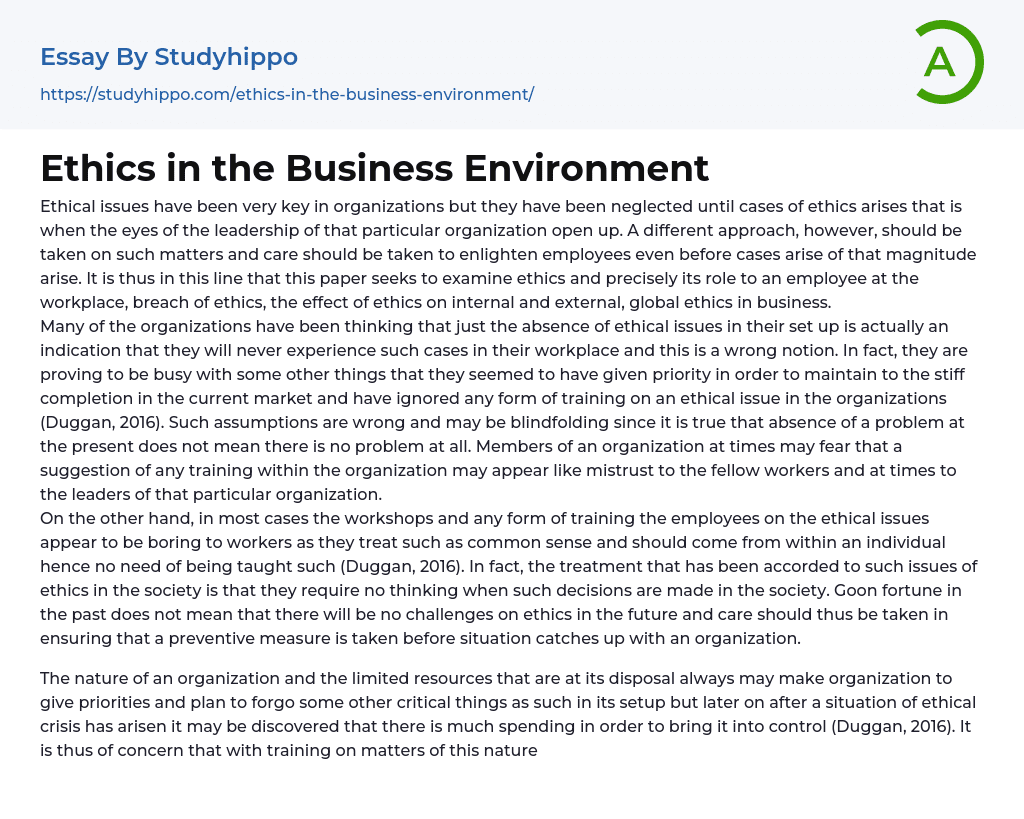This paper seeks to explore the role of ethics in the workplace, breaches of ethics, the internal and external impact of ethics, and global business ethics. Organizations often overlook ethical issues until significant cases arise, prompting leaders to take notice. However, it is crucial for employees to be educated about ethics even before major incidents occur. Many organizations incorrectly assume that the absence of ethical issues means they will not encounter such situations. As a result, they prioritize other matters to remain competitive in the market and neglect ethical training within their organizations (Duggan, 2016).
Many people mistakenly assume that if there are no current problems, there is also no potential for future ones. This lack of awareness can be problematic within an organization. When suggesting training, it may be perceived as a lack of confidence in colleagues and leaders, which can generate fear among members. However,
...employees often find workshops and ethical training tedious because they believe ethical decision-making should come naturally. Consequently, society tends to view critical thinking as unnecessary when dealing with ethical issues.
Although previous achievements do not ensure an ethical future, it is vital for organizations to implement preventative measures. Due to limited resources, organizations often prioritize certain areas and neglect crucial matters, which can result in higher expenses when confronted with ethical crises. Thus, providing ethics training within the organization is essential to guarantee the adherence to appropriate decision-making procedures. While training cannot entirely eradicate such incidents, it can assist in reducing the impact of a crisis (Duggan, 2016).
It is crucial for any organization to highlight and embrace ethical concerns as they greatly impact the organization's operations and profitability. In th
business world, it is important to recognize that practicing good ethical conduct can attract a larger customer base, leading to increased profitability. Additionally, it can reduce employee turnover and enhance productivity by retaining experienced employees. Moreover, it has the potential to attract more investors and employees, thereby reducing recruitment expenses while bringing diverse skills to the organization (Hooft ; Athanassoulis, 2014). The increased interest from investors will drive up the company's share prices, ultimately contributing to its success.
Management teams of any organization should consider the following references:
References
- Hooft, S, & Athanassoulis, N. (2014). The handbook of virtue ethics. Durham: Acumen Publishing Limited.
- Duggan K. Public Management (00333611). Jun 2016,Vol. 98 Issue 5, p2-3. 2p
- Accounting essays
- Marketing essays
- Automation essays
- Business Cycle essays
- Business Model essays
- Business Operations essays
- Business Software essays
- Corporate Social Responsibility essays
- Infrastructure essays
- Logistics essays
- Manufacturing essays
- Multinational Corporation essays
- Richard Branson essays
- Small Business essays
- Cooperative essays
- Family Business essays
- Human Resource Management essays
- Sales essays
- Market essays
- Online Shopping essays
- Selling essays
- Strategy essays
- Management essays
- Franchising essays
- Quality Assurance essays
- Business Intelligence essays
- Corporation essays
- Stock essays
- Shopping Mall essays
- Harvard Business School essays
- Harvard university essays
- Trade Union essays
- Cooperation essays
- News Media essays
- Waste essays
- Andrew Carnegie essays
- Inventory essays
- Customer Relationship Management essays
- Structure essays
- Starting a Business essays
- Accounts Receivable essays
- Auditor's Report essays
- Balance Sheet essays
- Costs essays
- Financial Audit essays
- International Financial Reporting Standards essays
- Tax essays
- Accountability essays
- Cash essays
- Principal essays




